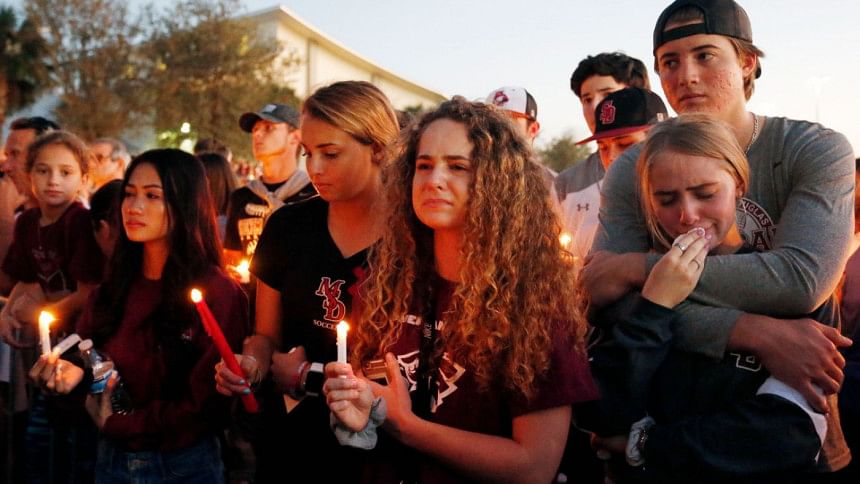America's lethal gun status quo

Nineteen-year-old Nikolas Cruz arrived at Marjory Stoneman Douglas High School in Parkland, Florida, in an Uber at 2:19pm on Wednesday, February 14. He carried a duffel bag in which he hid his semiautomatic AR-15 rifle. He entered the school building, pulled his weapon out and randomly shot people on a whim. Seventeen people, mostly students, were killed in the carnage.
This is the latest in a series of mass shootings in the United States. The statistics of mass shootings in the US are sobering. The Florida shooting is the 18th school shooting in 2018. According to published reports, a major mass shooting takes place every two months in the US. A total of 90 mass shootings were reported between 1966 and 2012. In just four years, between 2012 and 2016, a total of 46,445 people were killed by gunfire in the US. A great many of the victims were children. In fact, 22 million children in the US live in households with guns.
Gun violence has become so routine in the US that national media won't even report a shooting unless the casualties are high. A gunman killed at least five people in a small Northern California town on November 15, 2017, just days after a Texas church mass shooting which claimed 26 lives. The 24-hour cable news almost ignored the incident. Perhaps news media has become fatigued of the frequency of public shootings.
But it's surprising that no action has been taken to prevent mass shootings. People from all walks of life are expressing their sadness and frustration after the Florida shooting but politicians remain unfazed. The silence of the Republican Party that controls both houses of Congress and the presidency is predictable, unfortunately. But the Democratic Party is not mobilising either.
US politicians shamelessly follow the same playbook, which they have been using for years. After every attack they refuse to engage in discussion, let alone take any action. Like a trained parrot, they say, "It's not the time to discuss politics." They offer prayers but no action. Many politicians are reluctant to act because they do not want to take a risk. They do not want to face the wrath of pro-gun lobbying groups, especially the National Rifle Association (NRA).
NRA is one of the most powerful lobbying groups operating in the US. Politicians from both the Republican and Democratic parties seek NRA's blessings. NRA punishes politicians who support gun-control measures. The group, with its grassroots support, mobilising power and financial strength, exerts tremendous influence on politicians, especially when it comes to voting on issues like gun safety. NRA was established in 1871 but the lobbying group has emerged as a powerful actor in contemporary politics more recently.
The Second Amendment of the US Constitution gives NRA and other pro-gun groups the legal and philosophical backing. The Second Amendment includes the provision of maintaining a "well-regulated militia" so that the people can fight any government that might become tyrannical. The amendment gives citizens the legal right to possess firearms. However, in recent years, the debate on gun control has centred on owning military-style weapons. These weapons, especially AR-15 rifles, have been used in most mass shootings.
Guns are an important part of American culture. Unless someone lives in the rural part of the US and interacts with people who own guns, it would be almost impossible to understand the role of guns in American life and culture. Once I moved to Nebraska, I thought I had a better grasp of the gun issue. Most of my students and their families own guns and they talk about it openly. Hunting is not just a recreation for these people, it's a necessity. Their livelihood depends on hunting. Children grow up with guns in the family. They learn how to shoot a gun and hunt at an early age. They are comfortable around guns. Guns are ingrained in their daily life. Although guns are not a part of my life, I respect those who own guns for their safety and their livelihood.
Most gun owners would approve of what is now referred to as "common sense gun regulation." Universal background check is an important pillar of gun regulation. Even though background check is a part of existing gun law, loopholes allow people who should not have guns to get their hands on them. Many people with mental illness and prior criminal records have been able to purchase guns legally which means that the existing system of background check failed to detect them and prevent them from purchasing guns.
Background checks can perhaps be made more effective by closing the loopholes and enforcing the law strictly. But the most troubling part of the gun issue is in fact the guns themselves—the type of guns people should be allowed to own. The NRA and the gun lobby remain firm on their position that there should not be any restrictions on the ownership of guns. The courts mostly sided with the gun lobby. The result is an America littered with military-style guns—the type of guns that have nothing to do with hunting or personal safety. They are weapons of mass destruction. These guns have been used in all the contemporary mass shootings resulting in high casualties.
Many think that America's gun issue has something to do with the country's obsession with guns. Yes, many Americans are obsessed with guns. Yes, there is something called "gun culture" in America. But the most important aspect of the gun issue is political paralysis. Politicians always play it safe. They are too timid to confront the gun lobby. After every mass shooting voices get louder demanding action on gun control. The New York Times in an editorial asked: "Will America choose its children over guns?" Only time will tell. A hopeful sign is that children are getting involved and speaking up after the Florida shooting. The students who survived are on a mission—they are demanding action.
Shafiq Rahman is Professor and Chair of Communication and Social Sciences Department at Chadron State College, Nebraska, United States.

 For all latest news, follow The Daily Star's Google News channel.
For all latest news, follow The Daily Star's Google News channel. 



Comments